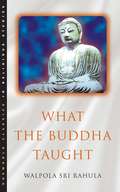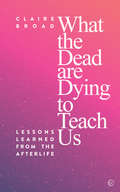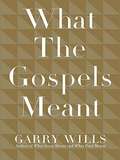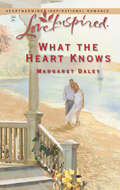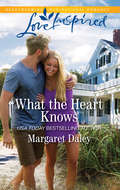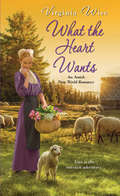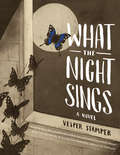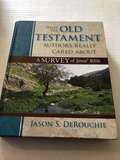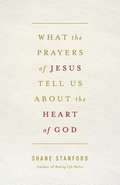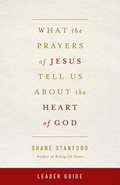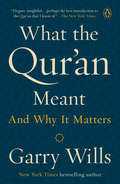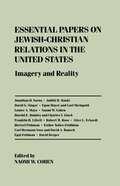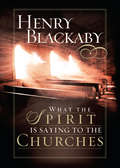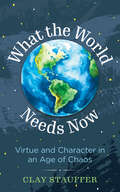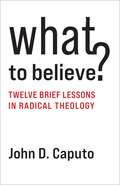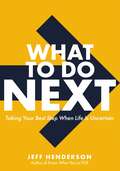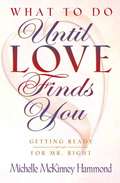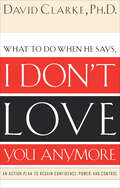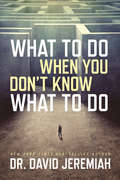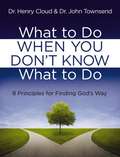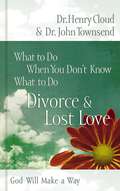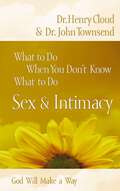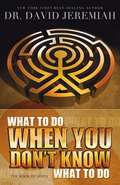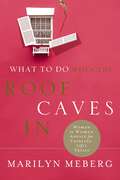- Table View
- List View
What the Buddha Taught: Revised And Expanded Edition With Texts From Suttas And Dhammapada (Oneworld Classics In Religious Studies)
by Walpola RahulaThis clear and informative guide draws on the words spoken by the Buddha to convey the true nature of Buddhist wisdom. It also features an illustrative section of texts from the Suttas and the Dhammapada, a glossary of Buddhist terms and an up-to-date bibliography.
What the Dead are Dying to Teach Us
by Claire BroadA fresh and thoroughly modern take on Afterlife communication. Claire Broad is known as the Honest Medium, in What the Dead are Trying to Teach Claire shares invaluable insights into life after death gained through her own experience, whilst also drawing on the most up-to-date scientific studies on consciousness.As a young child, Claire experienced psychic phenomena, as she grew older her experiences and the communications she received became stronger, resulting in Spirit teachers making their presence known and guiding her. Naturally analytical and now an adult, Claire was forced to question the validity of her experiences against the common academic opinion surrounding survival after physical death and embarked upon a life long quest for the truth. In her refreshingly down to earth, honest and open manner, Claire shares personal stories to bring comfort and hope to many whilst highlighting findings from consciousness studies that challenge our understanding of the world and encourage us to consider our true nature and full potential. Claire teaches us why we may have confidence there is life after death, how we can heal and awaken spiritually through the therapeutic practice of mediumship and most importantly what we can learn from those already on the other side in order to make the most of this life whilst we are here. By the end of this compelling book, readers will have an understanding that we all have a natural connection to the spirit world and will have gained tips and tools to deepen this connection; that death is an illusion; that our loved ones can visit us after their passing and that we can learn to recognise the signs; that genuine mediumship is a therapeutic practice and why visiting a medium is nothing to be feared; that spirit guides gently support us all; that it is natural for a child to display psychic ability and what you can do to support a child that does; that there is scientific research to support the validity of mediumship and psychic ability and that it is possible to seek evidence for survival as well as keeping faith.
What the Gospels Meant
by Garry Wills"A remarkable achievement-a learned yet eminently readable and provocative exploration of the four small books that reveal most of what’s known about the life and death of Jesus. ” ( Los Angeles Times ) In his New York Times bestsellers What Jesus Meant and What Paul Meant , Garry Wills offers tour-de-force interpretations of Jesus and the Apostle Paul. Here Wills turns his remarkable gift for biblical analysis to the four gospels of Matthew, Mark, Luke, and John. Wills examines the goals, methods, and styles of the evangelists and how these shaped the gospels' messages. Hailed as "one of the most intellectually interesting and doctrinally heterodox Christians writing today" (The New York Times Book Review), Wills guides readers through the maze of meanings within these foundational texts, revealing their essential Christian truths. .
What the Heart Knows
by Margaret DaleyKathleen Somers needed something to believe in again. Rocked by her husband' s death and her once-loving son' s transformation, she' d drifted away from God. It wasn' t until she met handsome Dr. Jared Matthews that she felt the first glimmer of hope. And something else... A burned-out widower, Jared thought he could offer Kathleen nothing but heartache. Still, he couldn' t desert her when the situation involving her son became a living nightmare. As he reached out to Kathleen, Jared finally saw what a relationship could be. Now he prayed that God' s love would give Kathleen the courage to follow her heart....
What the Heart Knows
by Margaret DaleySavor again this classic romance about a single mom getting a second chance, from top selling author Margaret Daley.Kathleen Somers needs something to believe in again. Rocked by her husband’s death and her once-loving son’s transformation, she’s drifted away from her faith. It’s not until she meets handsome Dr. Jared Matthews that she feels the first glimmer of hope. A burned-out widower, Jared thinks he has nothing but heartache to offer. Still, he can’t desert her when the situation with her son became too much. As he reaches out to Kathleen, Jared finally sees what a relationship can be. But only if Kathleen has the courage to follow her heart.... Originally Published in 2004
What the Heart Wants (Amish New World #3)
by Virginia WiseIn this latest novel in Virginia Wise&’s enthralling historical saga about America's first Amish settlement, two devoted sisters forge ahead in a difficult new world—only to find that love is a thrilling discovery of its own . . . Outgoing and irrepressible, young Christina has her choice of suitors. But she and her practical-minded older sister, Hilda, have built a thriving life in the rugged Pennsylvania backcountry. Hilda has given up her marriage dreams as foolish—and Christina vows she&’ll never marry until she finds her sister a husband. So when two handsome newcomers arrive, Christina engages in a bit of secret matchmaking—with disastrous results . . . Johan is used to hard work and overcoming obstacles. He&’s instantly drawn to Christina&’s lively nature—and agrees with her that his serious brother, Wilhelm, would be perfect for Hilda. But Christina&’s selfless schemes are keeping her from seeing how much Johan really cares for her. And between mishaps, mistakes, and an unintentional masquerade, Christina and Johan will need to search their hearts to understand themselves, set things right—and embark on a future together . . .
What the Night Sings
by Vesper Stamper<p>For fans of The Book Thief and The Boy in the Striped Pajamas comes a lushly illustrated novel about a teen Holocaust survivor who must come to terms with who she is and how to rebuild her life. <p>After losing her family and everything she knew in the Nazi concentration camps, Gerta is finally liberated, only to find herself completely alone. Without her papa, her music, or even her true identity, she must move past the task of surviving and on to living her life. In the displaced persons camp where she is staying, Gerta meets Lev, a fellow teen survivor who she just might be falling for, despite her feelings for someone else. With a newfound Jewish identity she never knew she had, and a return to the life of music she thought she lost forever, Gerta must choose how to build a new future.</p>
What the Old Testament Authors Really Cared About: A Survey of Jesus' Bible
by Jason DeRouchieAn accessible, full-color OT survey textbook focusing on the message of each book <p><p>Written from an irenic, evangelical perspective, this Old Testament survey is designed to unpack what the biblical authors most intended to communicate in the Scripture that Jesus read. As the corresponding volume to the previously published What the New Testament Authors Really Cared About (Kregel Academic, 2008), it is well-suited for use in a college, seminary, or church context. Students of the Bible will find this full-color textbook accessible and engaging. <p><p>What the Old Testament Authors Really Cared About is gospel-centered, portraying the Old Testament as the foundation for a fulfillment found in the New Testament. Each chapter is written by an Old Testament scholar who is a skilled teacher at one of the finest evangelical schools across North America and specializes in the biblical book covered.
What the Prayers of Jesus Tell Us About the Heart of God
by Shane StanfordMore than any other part of his ministry, Jesus’ prayers inform andengage his intentions for how the gospel would change lives and affectthe world. When we take time to review the moments when Jesus prayedwith his disciples or went away to pray alone, we engage both a storyand a set of lessons. Jesus doesn’t just pray as a means to be with theFather; he uses prayer as an instructional. Discover Jesus’ own hopesand desires when he prayed for us toHave a relationship with the FatherBe shaped by God’s wisdom and guidanceBe united with one anotherBring glory to GodHave consistency in our spiritual life What the Prayers of Jesus Tell Us About the Heart of God refines ourunderstanding of Jesus’ plans for his disciples (both in that firstcentury and for every century to follow). By witnessing even the mostintimate moments between the Father and the Son, we can learn somethingabout the big plan God has for our lives.
What the Prayers of Jesus Tell Us About the Heart of God Leader's Guide
by Shane StanfordIn What the Prayers of Jesus Tell Us About the Heart of God, author Shane Stanford introduced five prayer focuses--the five purposes Jesus had for praying to his Father that reveal Christ's hopes and desires for how we might also commune with God. Now, in this coordinating leader guide, Stanford provides helpful direction for groups wishing to study Jesus' prayers together. Five sessions coordinate with each of the five chapters of the book. Designed for a 45- to 60-minute meeting. Discussion questions engage group interaction. Group activities and easy-to-reproduce handouts provided for life application. Additional leader prompts, closing prayers, Scripture references, and summaries are included.
What the Qur'an Meant: And Why It Matters
by Garry WillsAmerica’s leading religious scholar and public intellectual introduces lay readers to the Qur’an with a measured, powerful reading of the ancient textGarry Wills has spent a lifetime thinking and writing about Christianity. In What the Qur’an Meant, Wills invites readers to join him as he embarks on a timely and necessary reconsideration of the Qur’an, leading us through perplexing passages with insight and erudition. What does the Qur’an actually say about veiling women? Does it justify religious war? There was a time when ordinary Americans did not have to know much about Islam. That is no longer the case. We blundered into the longest war in our history without knowing basic facts about the Islamic civilization with which we were dealing. We are constantly fed false information about Islam—claims that it is essentially a religion of violence, that its sacred book is a handbook for terrorists. There is no way to assess these claims unless we have at least some knowledge of the Qur’an. In this book Wills, as a non-Muslim with an open mind, reads the Qur’an with sympathy but with rigor, trying to discover why other non-Muslims—such as Pope Francis—find it an inspiring book, worthy to guide people down through the centuries. There are many traditions that add to and distort and blunt the actual words of the text. What Wills does resembles the work of art restorers who clean away accumulated layers of dust to find the original meaning. He compares the Qur’an with other sacred books, the Old Testament and the New Testament, to show many parallels between them. There are also parallel difficulties of interpretation, which call for patient exploration—and which offer some thrills of discovery. What the Qur’an Meant is the opening of a conversation on one of the world’s most practiced religions.
What the Rabbis Said: The Public Discourse of 19th Century American Rabbis
by Naomi W. CohenWhat the Rabbis Said examines a relatively unexplored facet of the rich social history of nineteenth-century American Jews. Based on sources that have heretofore been largely neglected, it traces the sermons and other public statements of rabbis, both Traditionalists and Reformers, on a host of matters that engaged the Jewish community before 1900.Reminding the reader of the complexities and diversity that characterized the religious congregations in nineteenth-century America, Cohen offers insight into the primary concerns of both the religious leaders and the laity—full acculturation to American society, modernization of the Jewish religious tradition, and insistence on the recognized equality of a non-Christian minority. She also discusses the evolution of denominationalism with the split between Traditionalism and Reform, the threat of antisemitism, the origins of American Zionism, and interreligious dialogue. The book concludes with a chapter on the professionalization of the rabbinate and the legacy bequeathed to the next century. On all those key issues rabbis spoke out individually or in debates with other rabbis. From the evidence presented, the congregational rabbi emerges as a pioneer, the leader of a congregation, as well as spokesman for the Jews in the larger society, forging an independence from his European counterparts, and laboring for the preservation of the Jewish faith and heritage in an unfamiliar environment.
What the Spirit Is Saying to the Churches (LifeChange Books)
by Henry BlackabyPeople today are hungry for God's sure guidance in their churches. But how do they find it? One of the strongest prophetic voices to the church today, Henry Blackaby, helps Christians grasp God's pattern for strengthening their churches, rather than relying on human ideas and methods that leave God on the periphery. They'll learn how to be sensitive individually and corporately to the effort of the Spirit, exploring the trustworthy principles by which the Lord longs to guide each congregation toward its own distinctive mission.From the Hardcover edition.
What the World Needs Now: Virtue and Character in an Age of Chaos
by Clay StaufferRedefine leadership and character.Discover a path to a more connected and meaningful life with What the World Needs Now. Written by Clay Stauffer, a seasoned pastor, professor, husband, and father, this book explores moral leadership, character, and values that transcend generational and cultural divides. With 30 concise chapters covering topics such as love, hope, diversity, and joy, Stauffer invites you to reflect on how we can improve our relationships, reshape culture, and build a sustainable future for generations to come. Blending Christian wisdom with universally accessible principles, the book illuminates the importance of virtues, emotional intelligence, and spiritual growth. What the World Needs Now inspires readers from all walks of life to embody values of decency, civility, and mutual respect.
What to Believe?: Twelve Brief Lessons in Radical Theology
by John D. CaputoIf you no longer “believe in God,” the Supreme Being of classical theology, or you never did in the first place, is there anything you still ought to believe, anything you should cherish unconditionally, no matter what? In this lively and accessible book, addressed to believers, “recovering” believers, disbelievers, nonbelievers, and “nones” alike—to anyone in search of what they really do believe—the acclaimed philosopher and theologian John D. Caputo seeks out what there is to believe, with or without religion.Writing in a lucid and witty style, Caputo offers a bold account of a “radical theology” that is anything but what the word theology suggests to most people. His point of departure is autobiographical, describing growing up in the world of pre-Vatican II Catholicism, serving as an altar boy, and spending four years in a Catholic religious order after high school. Caputo places Augustine’s Confessions, Tillich’s Dynamics of Faith, and Jacques Derrida and postmodern theory in conversation in the service of what he calls the “mystical sense of life.” He argues that radical theology is not simply an academic exercise but describes a concrete practice immediately relevant to the daily lives of believers and nonbelievers alike. What to Believe? is an engaging introduction to radical theology for all readers curious about what religion can mean today.
What to Do Next: Taking Your Best Step When Life Is Uncertain
by Jeff HendersonIf you want to change your career and circumstances but aren't sure how, this practical guide from business leader Jeff Henderson will help you reevaluate your purpose and determine your next best step.Navigating what's next in life--whether in your career, personal life, or relationships--often brings a level of uncertainty and anxiety and presents more questions than answers. Entrepreneur, speaker, and pastor Jeff Henderson has experienced this firsthand--first when he left his marketing position at Chick-fil-A to start a church and nonprofit, and then again when he left that nonprofit in the middle of a global pandemic to . . . well, he didn't know. He just knew he needed to make a move.This insightful book outlines the process he used to determine the next best step for him and how you, too, can pursue more meaning and purpose in your life and work. Sharing personal stories and best practices he's learned along the way, he eloquently and practically guides you through the minefield of knowing what's next by helping you:Take the Career Risk Calculator and discover if you're ready for changePlan for change--both the changes you want and the changes you can't see comingCultivate "optimal options" in your life that will guide you to better decision-making when the time comesIdentify what to do and what not to do when making decisions about what's nextExchange fear, confusion, and hopelessness for confidence, freedom, and purposeThe next chapter of your life starts today, with one simple step. And you'll know how to take that step because you know What to Do Next.
What to Do Until Love Finds You: Preparing Yourself for Your Perfect Mate
by Michelle Mckinney-HammondIn this book you'll discover practical steps for healthy, God-centered relationships, advice on how to avoid the pitfalls of dating and the tools needed to lay a solid, biblical foundation for true love.
What to Do When He Says, I Don't Love You Anymore: An Action Plan to Regain Confidence, Power, and Control
by David ClarkeDiscarding popular Christian advice to use romance and sweetness to draw a wandering spouse back into a marriage, Dr. David Clarke lays out a tough-love action plan for abused and betrayed spouses to rebuild their marriages through proven steps that will restore self-confidence one step at a time."I don't love you anymore." These simple words have the power to send the listener into shock, denial, and desperation. The obvious response is to ask oneself, "What can I do to win my partner back?" In this classic book, Christian psychologist Dr. David Clarke provides just the battle plan needed.Contrary to what many relationship "experts" recommend—weak, passive plans that involve begging or romancing a spouse back—Clarke offers an approach that he calls guerilla love, which essentially turns the tables on the wandering spouse.Drawing healthy boundaries and restoring your self-esteemFive things your spouse really means when saying, "I don't love you anymore"The most popular "exit lies" and how to see through themClassic symptoms of a person who is having an affairLearning when it&’s time to walk awayThis book will remind you that you are worthy of love, that you are not a doormat, and that you are a prize. Dr. Clarke will empower and equip you to make the best and most God-honoring attempt at saving your marriage.
What to Do When You Don't Know What to Do
by David JeremiahSometimes the big and small decisions in life seem overwhelming. How do you know what choices to make about your career, kids, relationships? Even when you make good decisions, how do you avoid temptation along the way? In What to Do When You Don't Know What to Do, Dr. David Jeremiah walks you through the book of James to glean God's wisdom on issues such as finances, faith, and decision making. Most significantly, this practical book shows you how to have the kind of faith that perseveres in persecution, resists temptation, and responds obediently to God's Word. What does it look like to consider God in all your plans, depend on God rather than wealth, and put prayer above your personal efforts? It looks, as James discovered, like living a life of great joy.
What to Do When You Don't Know What to Do: 8 Principles for Finding God's Way (What To Do When You Don't Know Ser.)
by Henry Cloud John TownsendLife is difficult. Life for every person on earth is a challenging journey - with or without God. Those who invite God to join them on this adventure believe that when bad things happen they can trust God to be present and work on their behalf. But just exactly how does He go about the business of helping us when we don't know what to do? Henry Cloud and John Townsend believe God has given us instructions on how He makes a way for us when we call on Him. If you follow God's eight principles in this book, you can thrive relationally, emotionally, and spiritually.As clinical psychologists, the authors deal daily with real people facing real problems, so this book is not just psychological or biblical theory. It is a life system that captures God's wisdom for coping with our most difficult problems.
What to Do When You Don't Know What to Do: Divorce & Lost Love (What to Do When You Don't Know)
by Henry CloudBased on the incredible success of the book What to Do When You Don't Know What to Do, Dr. Henry Cloud and Dr. John Townsend offer a line of books that address specific crises and some of the most prevalent problems facing our culture today. These books give readers a starting point to deal with their problems. Beautifully designed in a full-color small format, these books are perfect for giving to a friend in distress.
What to Do When You Don't Know What to Do: Sex & Intimacy (What to Do When You Don't Know)
by Henry CloudBased on the incredible success of the book What to Do When You Don't Know What to Do, Dr. Henry Cloud and Dr. John Townsend offer a line of books that address specific crises and some of the most prevalent problems facing our culture today. These books give readers a starting point to deal with their problems. Beautifully designed in a full-color small format, these books are perfect for giving to a friend in distress.
What to Do When You Don't Know What to Do: The Book of James
by David JeremiahAccording to Dr. Jeremiah: "In life, we often find ourselves not knowing what to do when faced with trials and temptations. This book is the perfect guide for those uncertain situations. What to Do When You Don't Know What to Do explains how to have the kind of faith that perseveres in persecution, resists temptation, responds obediently to God's Word, overcomes prejudice, produces good works, controls the tongue, follows God's wisdom, considers God in all its plans, depends on God rather than wealth, waits patiently for the return of the Lord, and makes prayer, not personal effort, its spiritual resource." Through study questions and exercises, at the back of the book, the author encourages his readers to apply the insights they have obtain from reading his work along with the Book of James and other relevant scriptures to their own lives.
What to Do When You're Dating a Jew: Everything You Need to Know from Matzoh Balls to Marriage
by Jennifer A. Block Vikki WeissLearn everything you need to know about the holidays, traditions, beliefs, and culture of the Jew you love . . . and his or her family. From what to order in a Kosher deli to what to wear to a Purim party, this book answers all the questions you'll face as the love interest of a nice Jewish boy or girl. What to Do When You're Dating a Jew will:give you a quick overview of the basics of Judaismprepare you for meeting your significant other's Jewish familybrief you on Jewish holidays, ceremonies, and ritualsalert you to potentially embarrassing situations and show you how to avert them entertain you with "It happened to me" stories from interfaith couplesPeppered with definitions of Yiddish terms, historical facts, jokes, quotes, and even recipes, this is essential reading for any woman or man involved with a Jew, whether looking for a deeper understanding of the Jewish faith or simply looking to survive a first seder at Bubbe's house.From the Trade Paperback edition.
What to Do When the Roof Caves In: Woman-to-Woman Advice for Tackling Life's Trials
by Marilyn MebergCan I recover from this? What are the warning signs? Why would God let this happen? We all walk through life with nagging questions?questions that spring from fear, doubt, guilt, and pain. And the harder we fight to ignore them, the faster they weaken our defenses. Like hail on a weak roof, they pile up until the sky comes falling in. Counselor, author, and speaker Marilyn Meberg knows what rains down on us, and she's here to help. With words of encouragement, wit, and wisdom, Marilyn speaks to those issues that can cripple us or make us stronger. Adultery, depression, pornography, suicide, boundaries, addiction . . . She knows there's nothing too difficult for God, no one too shattered for his love. Through stories, humor, scripture, and her trademark conversational style, Marilyn can help you pick up the pieces?or avoid the cave-in altogether. "This is a gutsy book! Marilyn tackles tough topics like addictions, pornography, divorce, and death but still manages to make me laugh. My favorite thing in life is to learn and still have a good time. I learned and I laughed while reading this book; great combination!" ?Luci Swindoll
